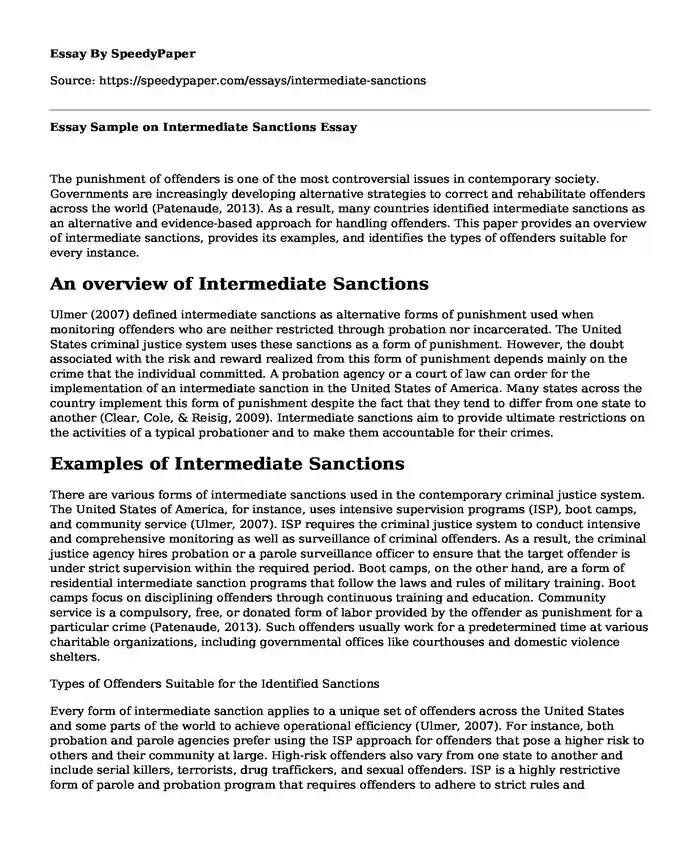
| Type of paper: | Critical thinking |
| Categories: | Criminal law Punishment Criminal justice Social issue |
| Pages: | 3 |
| Wordcount: | 776 words |
The punishment of offenders is one of the most controversial issues in contemporary society. Governments are increasingly developing alternative strategies to correct and rehabilitate offenders across the world (Patenaude, 2013). As a result, many countries identified intermediate sanctions as an alternative and evidence-based approach for handling offenders. This paper provides an overview of intermediate sanctions, provides its examples, and identifies the types of offenders suitable for every instance.
An overview of Intermediate Sanctions
Ulmer (2007) defined intermediate sanctions as alternative forms of punishment used when monitoring offenders who are neither restricted through probation nor incarcerated. The United States criminal justice system uses these sanctions as a form of punishment. However, the doubt associated with the risk and reward realized from this form of punishment depends mainly on the crime that the individual committed. A probation agency or a court of law can order for the implementation of an intermediate sanction in the United States of America. Many states across the country implement this form of punishment despite the fact that they tend to differ from one state to another (Clear, Cole, & Reisig, 2009). Intermediate sanctions aim to provide ultimate restrictions on the activities of a typical probationer and to make them accountable for their crimes.
Examples of Intermediate Sanctions
There are various forms of intermediate sanctions used in the contemporary criminal justice system. The United States of America, for instance, uses intensive supervision programs (ISP), boot camps, and community service (Ulmer, 2007). ISP requires the criminal justice system to conduct intensive and comprehensive monitoring as well as surveillance of criminal offenders. As a result, the criminal justice agency hires probation or a parole surveillance officer to ensure that the target offender is under strict supervision within the required period. Boot camps, on the other hand, are a form of residential intermediate sanction programs that follow the laws and rules of military training. Boot camps focus on disciplining offenders through continuous training and education. Community service is a compulsory, free, or donated form of labor provided by the offender as punishment for a particular crime (Patenaude, 2013). Such offenders usually work for a predetermined time at various charitable organizations, including governmental offices like courthouses and domestic violence shelters.
Types of Offenders Suitable for the Identified Sanctions
Every form of intermediate sanction applies to a unique set of offenders across the United States and some parts of the world to achieve operational efficiency (Ulmer, 2007). For instance, both probation and parole agencies prefer using the ISP approach for offenders that pose a higher risk to others and their community at large. High-risk offenders also vary from one state to another and include serial killers, terrorists, drug traffickers, and sexual offenders. ISP is a highly restrictive form of parole and probation program that requires offenders to adhere to strict rules and regulations. Such restrictions include refraining from drug abuse and alcohol drinking alongside typical regulations like reporting to a probation officer weekly (Clear et al., 2009). ISP also works in collaboration with other forms of intermediate sanctions, such as fines and home confinement.
Juvenile criminals, on the other hand, are the main types of offenders that utilize the boot camps across the United States. The primary aim of boot camps is to minimize the rate of recidivism by changing juvenile offenders' behaviors (Ulmer, 2007). Such approaches include the antisocial activities that may, in turn, increase the probability of participating in criminal activities. This change takes place through continuous reinforcement of positive behavior, followed by immediate punishment to discourage those that are negative. Lastly, community service applies to low-risk offenders, such as people found guilty for looting or property damage (Patenaude, 2013). However, community service is often unavailable for offenses punished by life imprisonment or death.
Conclusion
Intermediate sanctions are an alternative form of punishing offenders used in various countries across the world. An intermediate sanction is a critical form of crime deterrence because it allows offenders to live in their communities and, in turn, serve as an example to every person on the effects of engaging in various crimes. The United States, for example, uses multiple strategies, including ISP, boot camps, and community service. Every instance of intermediate sanction applies to various types of offenders, as discussed in this paper.
References
Clear, T. R., Cole, G. F., & Reisig, M. D. (2009). American corrections. Belmont, CA: Thomson Wadsworth.
Patenaude, A. A. (2013 February). Intermediate sanctions and community-based corrections. Research Gate. Retrieved from https://www.researchgate.net/publication/235411267_Intermediate_Sanctions_and_Community-Based_Corrections.
Ulmer, J. T. (2007). Intermediate sanctions: A comparative analysis of the probability and severity of recidivism. Sociological Inquiry, 71(2), 164-193. Retrieved from https://www.researchgate.net/publication/229454237_Intermediate_Sanctions_A_Comparative_Analysis_of_the_Probability_and_Severity_of_Recidivism.
Cite this page
Essay Sample on Intermediate Sanctions. (2023, Mar 21). Retrieved from https://speedypaper.net/essays/intermediate-sanctions
Request Removal
If you are the original author of this essay and no longer wish to have it published on the SpeedyPaper website, please click below to request its removal:
- Emotional Healing and Its Social Impact, Free Essay
- Water Infrastructure Essay Example
- Free Essay on the Shakespeare's View of Basic Human Nature in King Lear
- ISIS Analysis Essay Sample
- Free Essay Example on Product Disassembly
- Free Paper With Annotated Bibliography on Diabetes
- Free Essay Example on Cotton History
Popular categories




